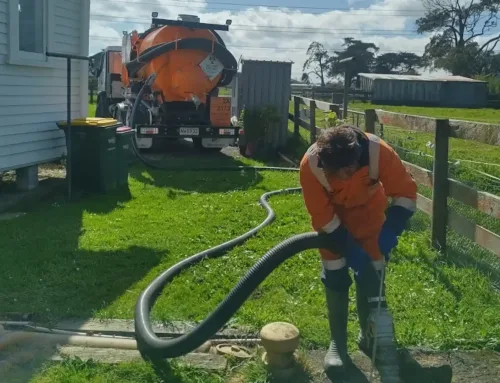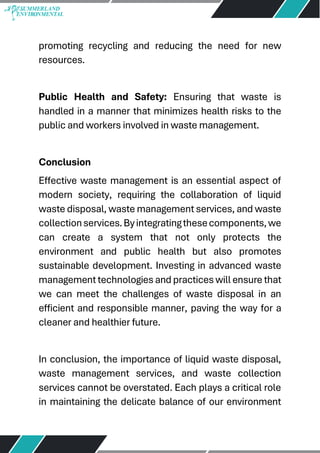6 Easy Facts About Reclaim Waste Explained
6 Easy Facts About Reclaim Waste Explained
Blog Article
The Reclaim Waste Statements
Table of ContentsThe 20-Second Trick For Reclaim WasteReclaim Waste Fundamentals ExplainedThe Reclaim Waste Statements7 Easy Facts About Reclaim Waste DescribedThe 10-Minute Rule for Reclaim Waste
Check out the kinds, incidents, and types of fluid waste. Domestic sewage waste describes the waste and products from a domestic septic system. This kind of waste is created by people in homes, schools, and various other buildings. This only includes septic systems that have a drain field. The correct management and disposal of domestic sewage waste call for liquid waste to be moved to a sewer treatment plant where the proper techniques and equipment are used to cleanse and deal with waste.
Industrial waste commonly consists of prospective threats, such as combustible products or a blend of fluid and solid waste items, and calls for a much more innovative and thorough disposal process. The disposal of industrial waste generally entails the filtration of waste prior to transportation to ensure safe and appropriate disposal. Industrial waste is produced from byproducts and drainage of commercial procedures and production.
This type of waste can not make use of the same sewer administration transportation or procedures as septic or industrial fluids. The industrial waste monitoring procedure calls for the examination and screening of liquid waste before it goes through the disposal procedure (liquid waste disposal). Overflow waste is the fluid waste that originates from overflow and excess stormwater in extremely inhabited locations or cities
Overflow waste can cause contamination and flooding if not dealt with correctly. Making sure correct waste administration can prevent catastrophes and lower ecological injury.
Not known Details About Reclaim Waste
Contact PROS Providers today to find out about our waste administration and disposal services and the proper means to care for the liquid waste you produce.
(https://www.openstreetmap.org/user/reclaimwaste1)Do you recognize what takes place to your water when you disengage, flush the commode or drain the washing equipment? No? Well, it deserves understanding. This so-called 'wastewater' is not only an important resource but, after treatment, will be launched to our land, rivers or the ocean. Utilized water from toilets, showers, baths, kitchen sinks, washings and industrial procedures is called wastewater.

water used to cool down equipment or tidy plant and tools). Stormwater, a type of wastewater, is overflow that flows from agricultural and urban locations such as roofings, parks, yards, roads, courses and rain gutters into stormwater drains pipes, after rain. Stormwater flows untreated directly to local creeks or rivers, ultimately getting to the ocean.
The smart Trick of Reclaim Waste That Nobody is Talking About
In Queensland, a lot of wastewater is dealt with at sewage therapy plants. Wastewater is moved from domestic or industrial sites with a system of sewers and pump stations, referred to as sewerage reticulation, to a sewer treatment plant. Local governments construct, preserve and operate most sewer treatment plants. Operators are licensed under the Environmental Management Act 1994 to release cured wastewater at an acceptable environmental criterion into rivers.
The Division of Natural Resources advises city governments regarding managing, operating and keeping sewage systems and therapy plants. In unsewered areas, local federal governments might require householders to install individual or household sewer treatment systems to treat domestic wastewater from bathrooms, kitchens, shower rooms and washings. The Department of Natural Resources authorizes the usage of home systems when they are proven to be efficient.
The majority of stormwater obtains no therapy. In some new subdivisions, treatment of some stormwater to remove litter, sand and gravel has begun using gross toxin catches. Wastewater treatment happens in 4 stages: Eliminates solid matter. Larger solids, such as plastics and various other objects wrongly released to go now sewers, are gotten rid of when wastewater is gone through displays.
Wastewater after that streams right into large containers where solids settle and are removed as sludge. Oil and residue are skimmed from the surface. Makes use of tiny living microorganisms knows as micro-organisms to damage down and remove remaining liquified wastes and fine fragments. Micro-organisms and wastes are included in the sludge. Removes nitrogen and phosphorus nutrients that can create algal blooms in our rivers and threaten aquatic life.
An Unbiased View of Reclaim Waste
Nutrient removal is not offered in all sewage treatment plants since it calls for expensive specialised equipment. It is coming to be more common in Queensland. Clear liquid effluent generated after treatment may still consist of disease-causing micro-organisms. If this effluent is launched right into rivers such as rivers or the sea, the micro-organisms will ultimately pass away out.

This typically suggests wastewater needs to be dealt with or pollutants removed prior to it can be released to waterways. Many wastewater streams right into the sewage system. Under the Act, local governments administer approvals and licences for ecologically pertinent activities (Ages) involving wastewater launches that could have a local impact. The department administers approvals and permits to Ages entailing wastewater launches that might have a local or statewide impact.
Rumored Buzz on Reclaim Waste
Otherwise, examples are taken for lab analysis. Often several examinations are needed to establish the degrees of each of the different pollutants such as oils, hefty metals and pesticides in water. Surveillance offers accurate details about water top quality and can confirm that licence conditions are being met. The info gotten via surveillance offers the basis for making water high quality choices.
Report this page